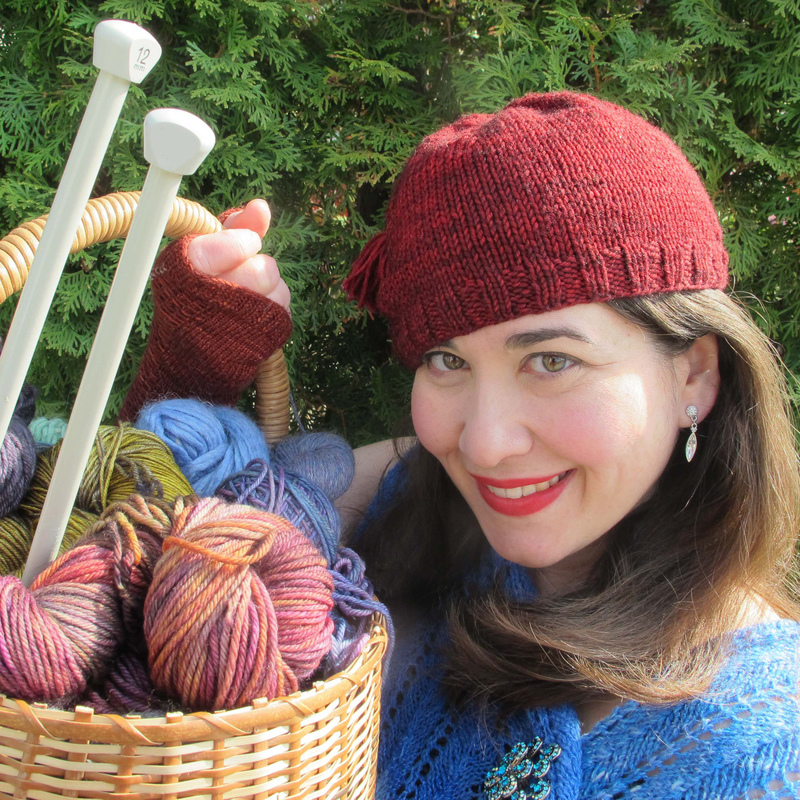Image Description: Melanie Gall holding up a weaved basket filled with balls of yarn in a variety of colours. Two knitting needles stick out of the basket as well. Her whole outfit is made out of knitted materials.
By Cate Tweedie
In these modern times, the skill of knitting is relegated to older women, introverts and that one hipster on the train. But that wasn’t always the case: knitting has an embroidered history, and Stitch in Time: A Knitting Cabaret is here to tell you about one of its most interesting and socially relevant periods. Composed of ‘lost’ songs from WWI and WWII, Stitch in Time tells the story of knitting and its relevance during wartime, from propaganda to practicality.
The evening is presented by Melanie Gall, a vocalist who holds five opera degrees, having performed from the Lincoln Center to the Royal Albert Hall. Gall decided to craft a cabaret with the research diligence of an academic, but far more accessible than any peer-reviewed article.
Due to knitting’s association with a slightly more elderly audience, I found myself the youngest member of the crowd, the only downfall to this situation being I hadn’t thought to bring my own knitting along.
The substance of the show was the historical importance of knitting to those on the Home Front, which for some was the only way they could contribute effectively to the war effort. Unlike today, knitting was practiced widely by men as well as women, and so entire households would sit and knit together, as well as in public. The songs Gall presented from WWI were mainly cheesy and simple, as they were written to sell sheet music to be played at home. Topics included the high romantic appeal of knitters, as well as a lot of songs about women called Kitty or Kitten due to the convenient rhyming scheme.
WWII took on a different tone, with rampant yarn shortages ensuring a higher level of desperation. During this time, knitting was utilised for covert operation, including ladies knitting code into scarf patterns and hiding radio equipment in knitting bags. The songs from this time were more commercial, played on the radio or sung at supper clubs. Gall made a special effort to tailor some of these stories to an Australian audience, with mention of local knitting heroes, including a prisoner of war and a performance artist from Melbourne who knits with wool from her lady parts.
Gall was an excellent performer and storyteller, and in some songs, she was able to show off her beautiful high range. She understood the ridiculous nature of the pieces and laughed along with the audience. The songs themselves were a product of their time, but it definitely made sense that some of them were ‘lost.’ Overall, the cabaret presented a surprising educational experience about a relatively unknown, but impactful, historical phenomena.
Stitch in Time: A Knitting Cabaret takes a bunch of cheesy wartime songs about knitting and interweaves them with stories of genuine human accomplishment, hardship and ingenuity. Melanie Gall has a yarn about yarn, and presents a highly entertaining cabaret show in the process. Go check it out if you like history, heroines or haberdashery.
If you want to catch this show, it’s playing at Lazy Susan’s Comedy Den until the 16th. For information on tickets go here.
4 attractive and romantic knitters out of 5
Cate is an honorary member of a knitting circle in rural Tasmania.
Image courtesy of FRINGE WORLD Festival
Woodside Petroleum is a principal sponsor of FRINGE WORLD Festival. Pelican has been a long-time supporter of the Festival, and will continue to show its support. However, the Magazine feels it is unethical for Woodside Petroleum to remain a principal sponsor of FRINGE WORLD, given the current climate emergency, and Woodside’s ongoing contribution to climate change.
Other Festivals have demonstrated that ethical sources of funding are possible – you can read more, and sign the petition, here: https://www.change.org/p/fringeworld-side-with-the-climate-and-drop-woodside-petroleum // #fossilfreefringe #fossilfreearts // Arts and Cultural Workers for Climate Action

